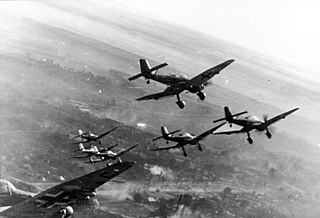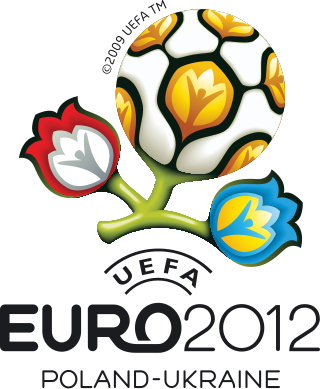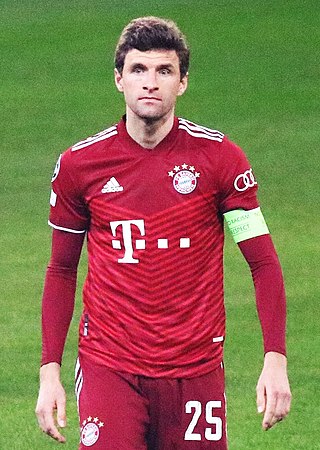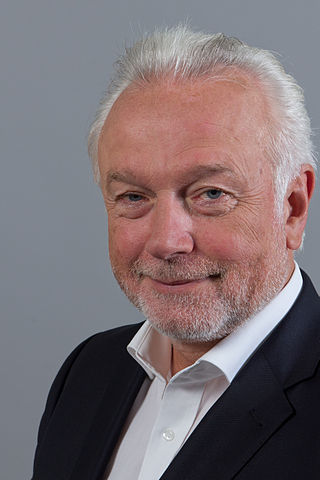
Berlin is the capital and largest city of Germany, both by area and by population. Its more than 3.85 million inhabitants make it the European Union's most populous city, as measured by population within city limits having gained this status after the United Kingdom's, and thus London's, departure from the European Union. Simultaneously, the city is one of the states of Germany, and is the third smallest state in the country in terms of area. Berlin is surrounded by the state of Brandenburg, and Brandenburg's capital Potsdam is nearby. The urban area of Berlin has a population of over 4.5 million and is therefore the most populous urban area in Germany. The Berlin-Brandenburg capital region has around 6.2 million inhabitants and is Germany's second-largest metropolitan region after the Rhine-Ruhr region, and the sixth-biggest metropolitan region by GDP in the European Union.

Franz Kafka was a German-language novelist and writer from Prague. He is widely regarded as one of the major figures of 20th-century literature. His work fuses elements of realism and the fantastic. It typically features isolated protagonists facing bizarre or surrealistic predicaments and incomprehensible socio-bureaucratic powers. It has been interpreted as exploring themes of alienation, existential anxiety, guilt, and absurdity. His best known works include the novella The Metamorphosis and novels The Trial and The Castle. The term Kafkaesque has entered English to describe absurd situations like those depicted in his writing.

Germany, officially the Federal Republic of Germany (FRG), is a country in Central Europe. It lies between the Baltic and North Sea to the north and the Alps to the south. Its 16 constituent states have a total population of over 84 million in an area of 357,569 km2 (138,058 sq mi), making it the most populous member state of the European Union. It borders Denmark to the north, Poland and Czechia to the east, Austria and Switzerland to the south, and France, Luxembourg, Belgium, and the Netherlands to the west. The nation's capital and most populous city is Berlin and its main financial centre is Frankfurt; the largest urban area is the Ruhr.

Heinrich Luitpold Himmler was a German politician who was the 4th Reichsführer of the Schutzstaffel, a leading member of the Nazi Party of Germany, and one of the most powerful men in Nazi Germany, primarily known for being a main architect of the Holocaust.

The Munich massacre was a terrorist attack carried out during the 1972 Summer Olympics in Munich, West Germany, by eight members of the Palestinian militant organization Black September. The militants infiltrated the Olympic Village, killed two members of the Israeli Olympic team, and took nine others hostage, who were later killed after a failed rescue attempt.

World War II or the Second World War was a global conflict between two alliances: the Allies and the Axis powers. Nearly all of the world's countries—including all the great powers—participated, with many having invested all available economic, industrial, and scientific capabilities in pursuit of total war, blurring the distinction between military and civilian resources. Tanks and aircraft played major roles, with the latter enabling the strategic bombing of population centres and delivery of the only two nuclear weapons ever used in war. World War II was the deadliest conflict in history, resulting in 70 to 85 million fatalities, more than half of which were civilians. Millions died in genocides, including the Holocaust of European Jews, and by massacres, starvation, and disease. Following the Allied powers' victory, Germany, Austria, Japan, and Korea were occupied, and war crimes tribunals were conducted against German and Japanese leaders.

The UEFA Champions League is an annual club association football competition organised by the Union of European Football Associations (UEFA) and contested by top-division European clubs, deciding the competition winners through a round robin group stage to qualify for a double-legged knockout format, and a single leg final. It is the most-watched club competition in the world and the third most-watched football competition overall, behind only the UEFA European Championship and the FIFA World Cup. It is one of the most prestigious football tournaments in the world and the most prestigious club competition in European football, played by the national league champions of their national associations.

Miroslav Josef Klose is a German professional football manager and former player who currently serves as head coach of 1. FC Nürnberg. A striker, Klose is the all-time top scorer for Germany and holds the record for the most goals scored in the FIFA World Cup with 16 goals scored over 4 editions of the tournament between 2002 and 2014.

The UEFA European Football Championship, less formally the European Championship and informally the Euro or Euros, is the primary association football tournament organised by the Union of European Football Associations (UEFA). The competition is contested by UEFA members' senior men's national teams, determining the continental champion of Europe. It is the second-most watched football tournament in the world after the FIFA World Cup; the Euro 2016 final was watched by a global audience of around 600 million. The competition has been held every four years since 1960, except for 2020, when it was postponed until 2021 due to the COVID-19 pandemic in Europe, but kept the name Euro 2020. Scheduled to be in the even-numbered year between FIFA World Cup tournaments, it was originally called the European Nations' Cup before changing to its current name in 1968. Since 1996, the individual events have been branded as "UEFA Euro [year]".

The Germany national football team represents Germany in men's international football and played its first match in 1908. The team is governed by the German Football Association, founded in 1900. Between 1949 and 1990, separate German national teams were recognised by FIFA due to Allied occupation and division: the DFB's team representing the Federal Republic of Germany, the Saarland team representing the Saar Protectorate (1950–1956) and the East Germany team representing the German Democratic Republic (1952–1990). The latter two were absorbed along with their records; the present team represents the reunified Federal Republic. The official name and code "Germany FR (FRG)" was shortened to "Germany (GER)" following reunification in 1990.

Hans-Christian Ströbele was a German politician and lawyer. He was a member of Alliance 90/The Greens, the German green party.

The Spain national football team has represented Spain in men's international football competitions since 1920. It is governed by the Royal Spanish Football Federation, the governing body for football in Spain.

The 2012 UEFA European Football Championship, commonly referred to as UEFA Euro 2012 or simply Euro 2012, was the 14th European Championship for men's national football teams organised by UEFA. The final tournament, held between 8 June and 1 July 2012, was co-hosted by Poland and Ukraine, and was won by Spain, who beat Italy in the final at the Olympic Stadium, Kyiv, Ukraine.

Omid Nouripour is a German-Iranian politician of the Alliance '90/The Greens who has been serving as a member of the Bundestag since 2006, representing the state of Hesse. Since 2022, he has also been serving as co-leader of Alliance 90/The Greens, alongside Ricarda Lang.

Manuel Peter Neuer is a German professional footballer who plays as a goalkeeper for Bundesliga club Bayern Munich, who he captains, and the Germany national team. Widely regarded as one of the greatest and most influential goalkeepers in the history of the sport, Neuer has been described as a "sweeper-keeper" because of his playing style and speed when rushing off his line to anticipate opponents, going out of the penalty area. He was named the best goalkeeper of the decade from 2011 to 2020 by IFFHS.

Thomas Müller is a German professional footballer who plays for Bundesliga club Bayern Munich. He has been deployed in a variety of attacking roles – as an attacking midfielder, second striker, centre forward, and on either wing. Regarded as one of the best players of his generation, Müller has been praised for his positioning, teamwork, stamina, and work-rate, and has shown consistency in both scoring and creating goals.

David Olatukunbo Alaba is an Austrian professional footballer who plays as a centre-back or left-back for La Liga club Real Madrid and captains the Austria national team. Considered one of the best defenders in the world, he is renowned for his versatility, technical skills and ability to contribute effectively in both defensive and offensive roles on the field.
Birkhäuser was a Swiss publisher founded in 1879 by Emil Birkhäuser. It was acquired by Springer Science+Business Media in 1985. Today it is an imprint used by two companies in unrelated fields:

Lena Johanna Therese Meyer-Landrut, also known by the mononym Lena, is a German singer. She rose to fame after representing Germany in the Eurovision Song Contest 2010 in Oslo, winning the event with the song "Satellite". Both "Satellite" and her debut album My Cassette Player (2010) debuted at number one in Germany and became platinum sellers. With her three entries from the German national final Unser Star für Oslo, Meyer-Landrut set an all-time chart record in her home country by debuting with three songs in the top five of the German Singles Chart. She represented Germany for the second consecutive time in the Eurovision Song Contest 2011 in Düsseldorf with the song "Taken by a Stranger", finishing in tenth place.

Wolfgang Kubicki is a German politician of the Free Democratic Party of Germany (FDP) and member of the Bundestag from 1990 until 1992 and 2017 onwards. He has been vice chairman of the FDP in Germany since December 2013. Since 24 October 2017 he has served as Vice President of the Bundestag. From 1992 to 1993 and from 1996 to 2017 he served as chairman of the FDP-group in the Schleswig-Holstein state parliament..






















